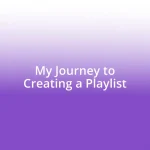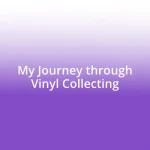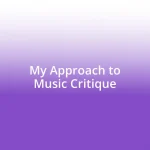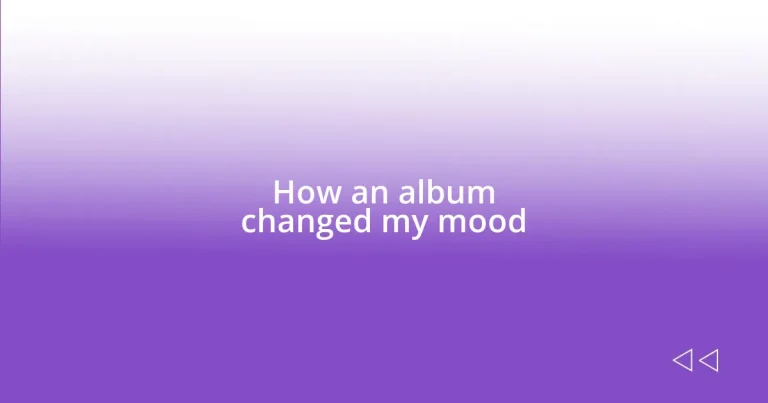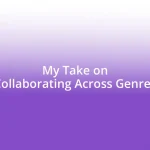Key takeaways:
- Music profoundly influences emotions, evoking nostalgia, lifting moods, and promoting relaxation.
- Personal experiences with albums can create significant emotional connections and shared moments with others.
- Identifying emotional triggers, such as chord progressions and lyrics, helps understand music’s impact on our feelings.
- Curating a personalized playlist can enhance mood and facilitate emotional healing through meaningful connections to memories.
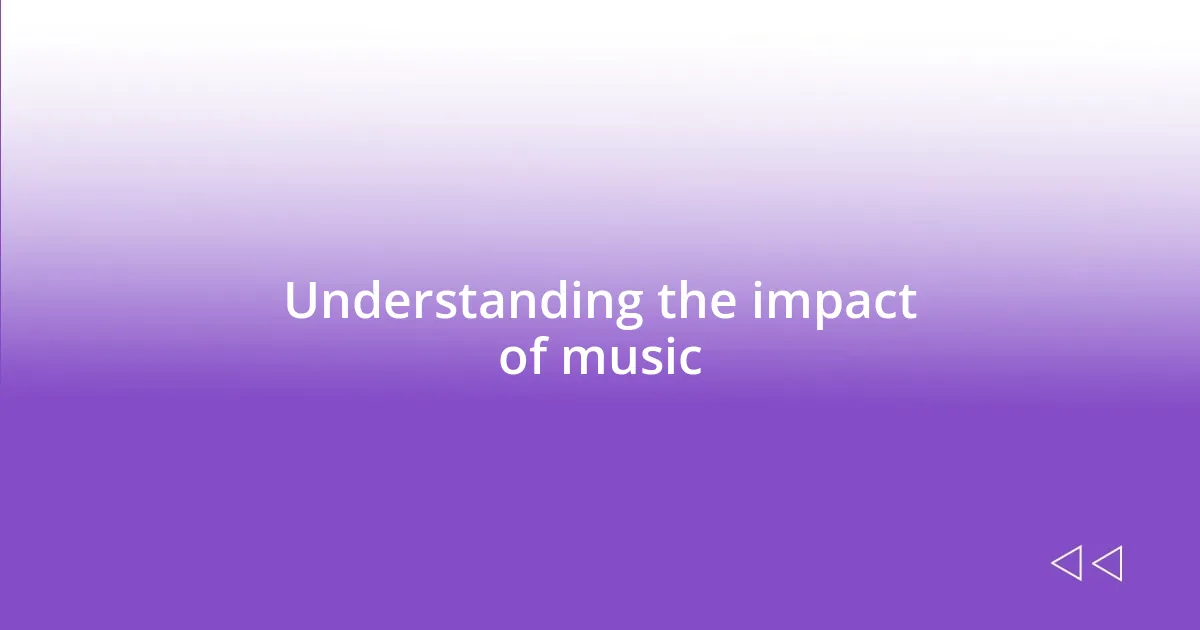
Understanding the impact of music
Music has a remarkable way of shaping our emotions, often acting like a mirror to our feelings. I remember one rainy afternoon when I stumbled upon a nostalgic album from my childhood. As the first notes flooded my ears, I was instantly transported back to a simpler time, filled with laughter and carefree days. Isn’t it fascinating how a few chords can evoke such vivid memories?
Beyond nostalgia, music can also serve as a powerful mood enhancer. There have been countless times when I felt overwhelmed, only to find solace in an upbeat playlist. The infectious rhythms and positive lyrics seemed to wrap around me like a warm blanket, lifting the weight off my shoulders. Have you ever noticed how a catchy tune can trigger an impromptu dance party, instantly banishing sadness?
Furthermore, the therapeutic effects of music are well documented; it can reduce stress and promote relaxation. Once, after a particularly challenging week, I turned to intimate acoustic sounds to help me unwind. I found that the gentle melodies not only calmed my racing mind but also encouraged me to reflect on my feelings, leading to a profound sense of peace. Could it be that music holds the key to emotional healing in more ways than we often realize?
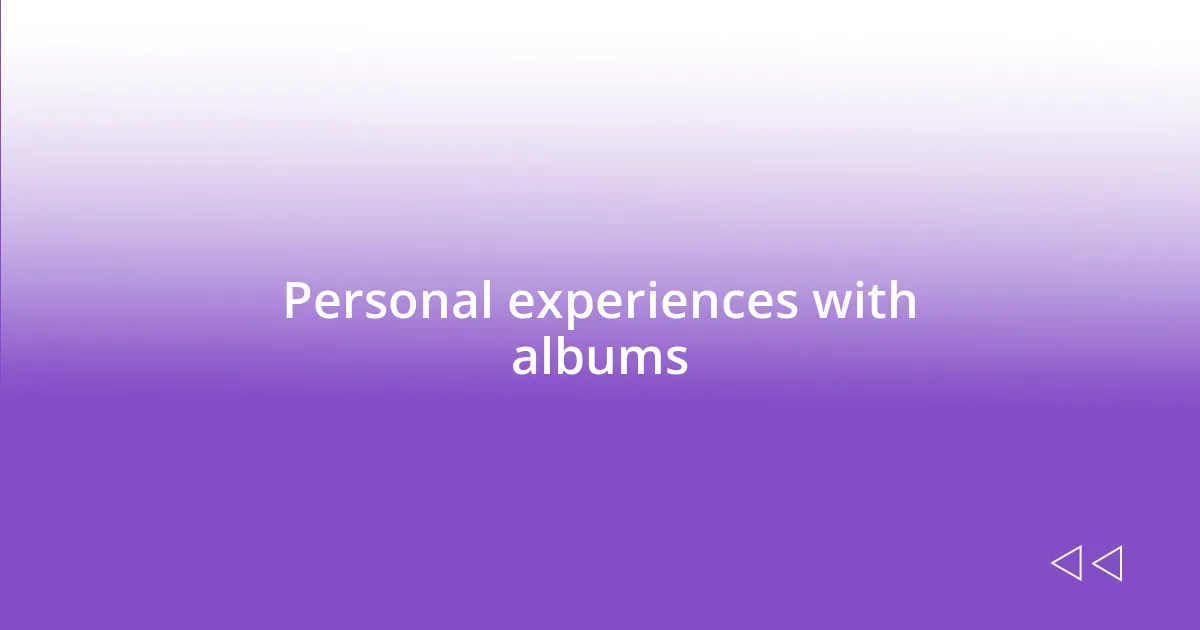
Personal experiences with albums
Listening to certain albums often feels like entering a different world entirely. I recall a time when I was feeling particularly anxious about an upcoming presentation. Instead of letting the worry consume me, I turned to a calming jazz album. The smooth saxophone and gentle piano eased my tension, grounding me in the moment and allowing my mind to clear, preparing me to face the day with renewed confidence.
There’s also something incredibly special about discovering an album that perfectly encapsulates a particular chapter of your life. During a significant relationship, I found solace in an indie folk album. Each song seemed to narrate our journey, from the exhilarating highs of love to the poignant moments of heartache. It was as if the artist had been a silent observer, capturing emotions I couldn’t fully articulate myself.
Albums can even create bonds between friends. One evening, a friend introduced me to a classic rock album during a cozy gathering. As we listened together, sharing stories and singing along, I felt an overwhelming sense of joy and connection. It reminded me how music not only influences our mood but also brings people closer, creating shared moments that linger long after the last note fades.
| Album | Effect on Mood |
|---|---|
| Childhood Nostalgia Album | Transported me back to carefree moments |
| Calming Jazz Album | Helped alleviate anxiety |
| Indie Folk Album | Captured the essence of love and loss |
| Classic Rock Album | Fostered joy and connection with friends |
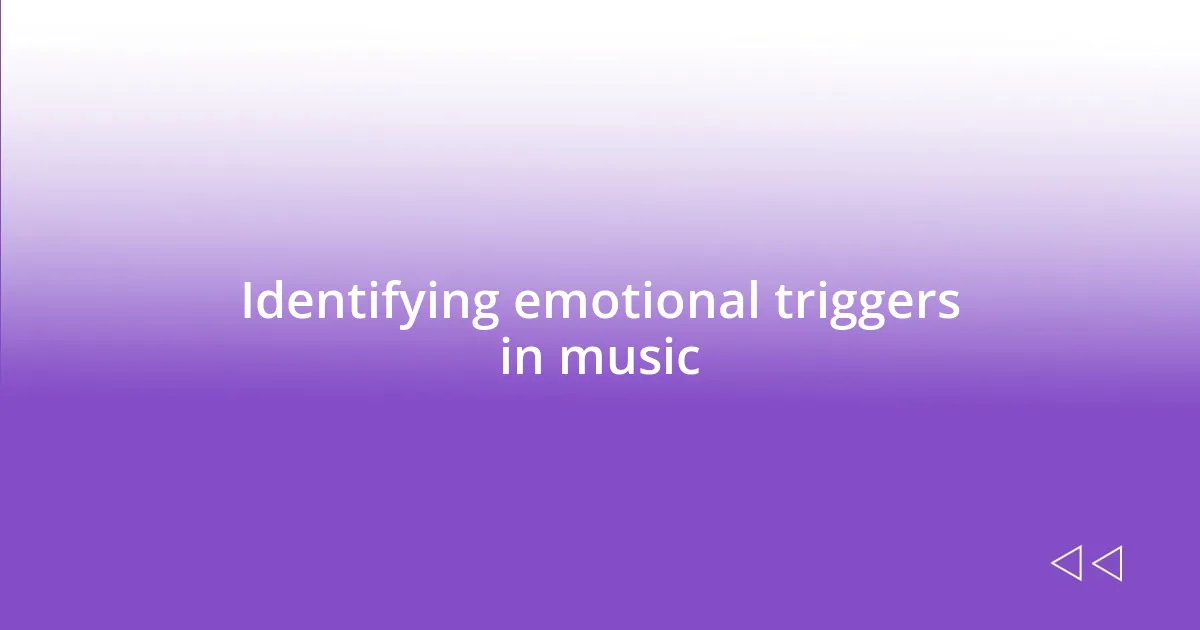
Identifying emotional triggers in music
Identifying emotional triggers in music goes beyond just the melodies and lyrics; it’s about finding what resonates with us on a personal level. For instance, I’ve noticed that minor chord progressions often evoke a sense of sadness or longing in me. Last summer, while listening to a classical piano piece, I found myself reflecting on past relationships, each note pulling memories to the surface like a tide. Understanding these triggers can illuminate why certain songs bring tears to our eyes or make us want to dance in joy.
Here are some common emotional triggers I’ve identified in music that many find relatable:
- Major Chords: Often bring feelings of happiness and upliftment, energizing your spirit.
- Minor Chords: Typically evoke sadness or nostalgia, reminding us of lost moments.
- Tempo: Faster tempos can provoke excitement and happiness, while slower tempos might promote relaxation or introspection.
- Lyrics: Relatable themes can resonate deeply, making us feel understood or less alone.
- Instrumental Sounds: Certain instruments, like the violin or guitar, can elicit specific emotions, like warmth or melancholy.
By paying attention to these triggers, we can better navigate our emotional landscapes through the music we choose to embrace.
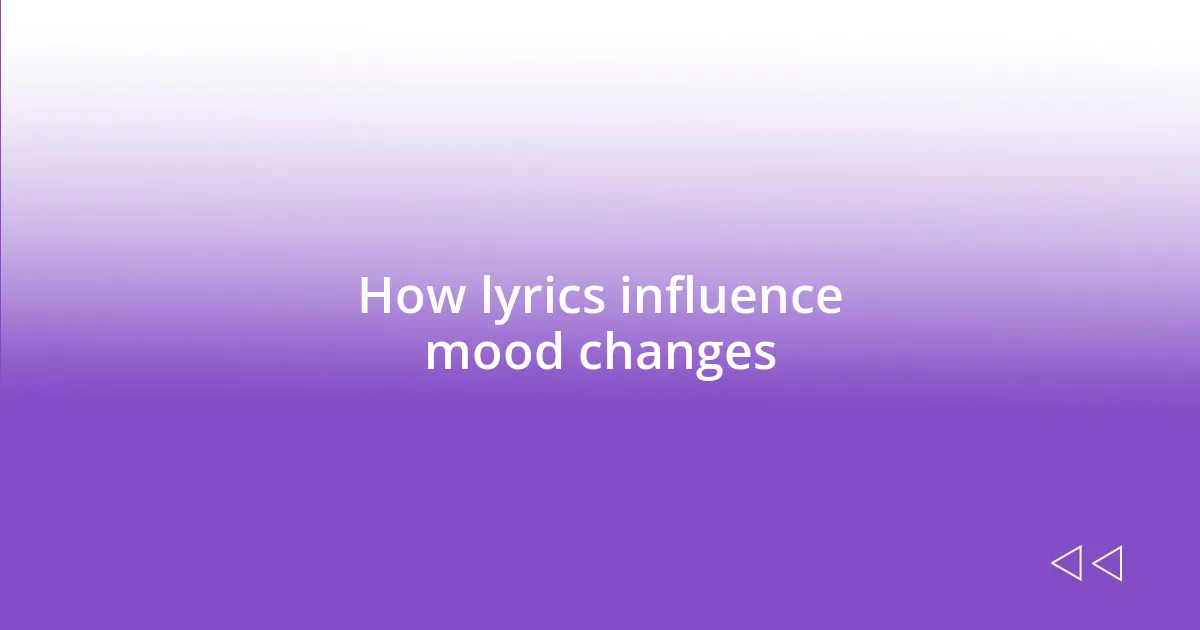
How lyrics influence mood changes
Lyrics have a remarkable ability to tap into our emotions. I remember the first time I heard a heartbreak song that perfectly mirrored my own feelings. The artist’s raw words resonated so deeply that I felt as if they were narrating my own experience, transforming my grief into something tangible and understood.
Have you ever noticed how a single line in a song can bring tears to your eyes while simultaneously making you smile? I experienced this when listening to a powerful ballad that spoke about resilience and hope. Those lyrics reminded me of my own journey through adversity, and instead of feeling overwhelmed, I felt empowered, ready to embrace life’s challenges with renewed strength.
Moreover, lyrics can serve as a healing balm during trying times. There have been moments when I’ve played an anthem filled with motivational phrases, and it completely shifted my mindset. Each verse acted like a gentle push, encouraging me to step beyond my comfort zone, proving to me just how influential language can be in lifting our spirits or helping us process complex emotions.
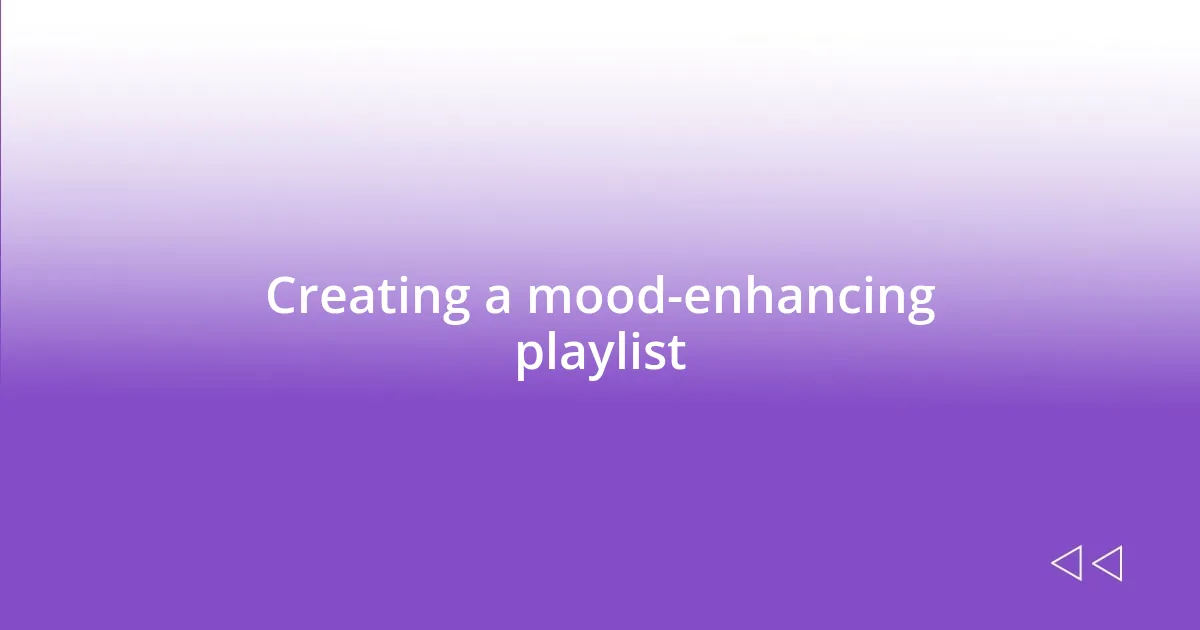
Creating a mood-enhancing playlist
Creating a mood-enhancing playlist can be an enjoyable yet introspective process. I often start by reflecting on the specific emotion I want to evoke. For example, when I need a boost of confidence, I dig through my collection for tracks that resonate with empowerment, like anthems that inspire me to conquer challenges. Does your playlist reflect your desires too?
As I compile songs, I pay attention to the flow and energy. There’s a certain magic in curating a balance of tempos and emotions; I once crafted a playlist that began with soft, soothing melodies to calm my nerves. Gradually, I interspersed upbeat tracks that got me dancing in my living room. The transformation in my mood was remarkable. Have you ever tried creating a playlist that takes you on a journey?
Don’t underestimate the importance of layering personal meaning into your choices. Including songs tied to specific memories can amplify their impact. For instance, I included a song from a memorable road trip with friends, and every time it plays, I’m transported back to that joy and laughter. This personal connection makes the music come alive, enhancing the mood in ways I never anticipated. What memories does your music evoke?
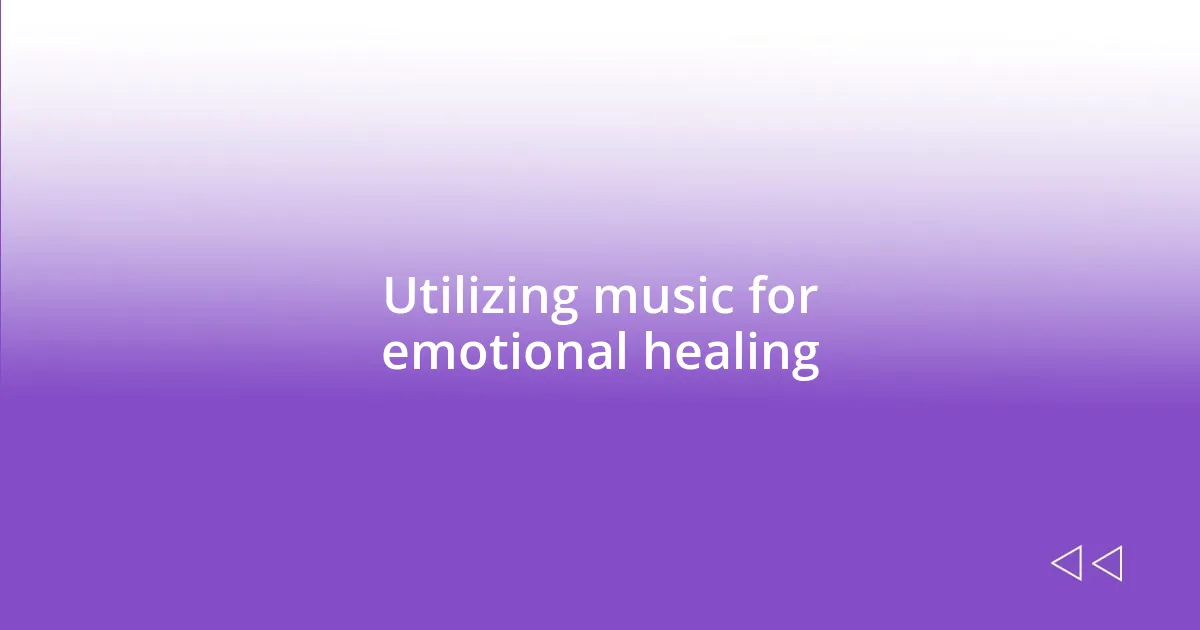
Utilizing music for emotional healing
Utilizing music for emotional healing can be a transformative experience. I still remember a particularly tough day when a soulful playlist across a rainy afternoon worked wonders on my mood. As each song played, I felt layers of stress and anxiety peel away, replaced by a comforting sense of understanding and relief that only music can provide.
It’s fascinating how different genres can evoke distinct emotional responses. For example, I once turned to classical music when feeling overwhelmed. I found the gentle piano notes offered a sanctuary, gently coaxing my mind away from turmoil to a serene space. Have you explored how different styles resonate with your feelings?
The power of music in promoting emotional healing often lies in its ability to create a shared experience. I recall playing a song from my childhood for my niece when she was grappling with her own insecurities. Watching her face light up as she sang along was heartwarming; it reminded me how music can bind generations, offering support and understanding through shared melodies. What songs bring you comfort and connection to others?
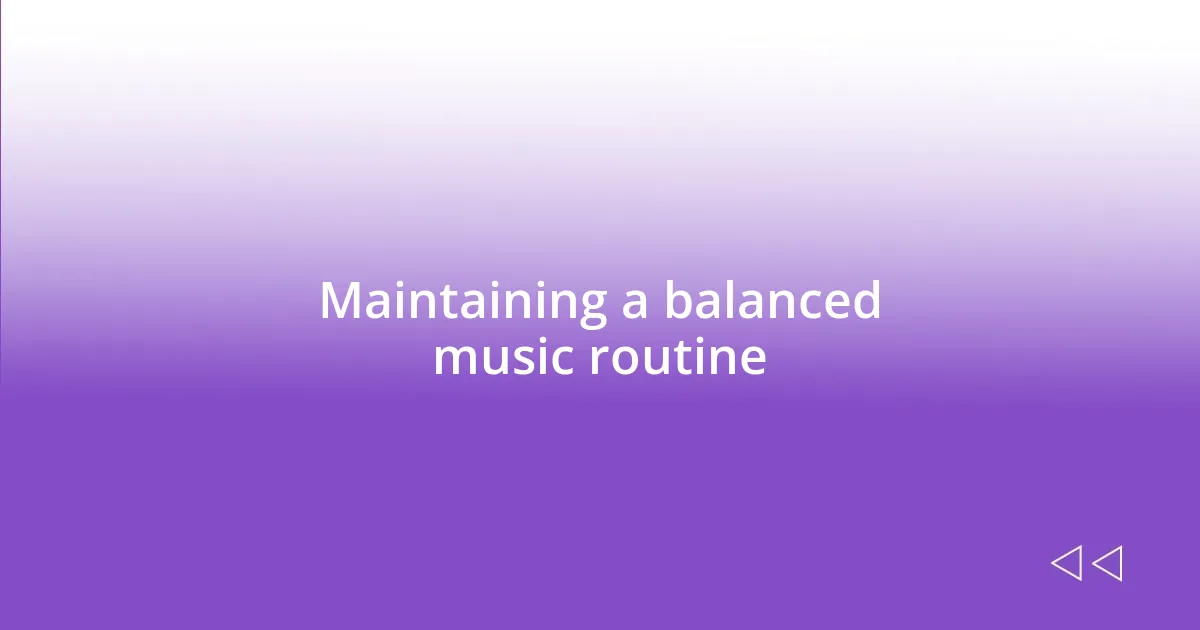
Maintaining a balanced music routine
Maintaining a balanced music routine involves intentionally integrating various musical experiences into my daily life. I find that setting aside time to listen to different genres helps me navigate my emotions more effectively. For instance, I often reserve mornings for upbeat pop songs that energize me, while evenings are perfect for mellow acoustic tunes that help me unwind. What have you discovered about your listening habits?
I love the idea of mixing music into my daily rituals. During work breaks, I might switch to instrumental tracks to boost focus—it’s like creating a soundscape that enhances productivity without distraction. I remember one particularly busy week; I discovered that listening to jazz while I worked made even the most mundane tasks feel more enjoyable. Have you experimented with music during your daily routines?
Finding that sweet spot between leisure and purpose in my music choices is key. I often ask myself whether the music I’m playing aligns with my current mood or helps shift it in a healthier direction. There have been times when I gravitated toward heavier genres, only to realize they weren’t serving me well in that moment—like that time I played grunge while feeling down, which just deepened my blues. How often do you assess the emotional impact of your music?





